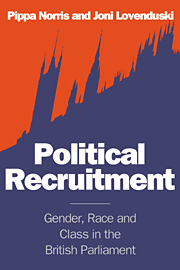1 - Puzzles in political recruitment
Published online by Cambridge University Press: 07 December 2009
Summary
This book aims to provide the first full account of legislative recruitment in Britain for twenty-five years. The central concern is why some politicians succeed in moving through the ‘eye of the needle’ into the highest offices of state. In democracies, many participate as grassroots party members, community activists, and campaign donors. Some become local or regional elected officers, party leaders, or lobbyists. From this pool of eligibles, some run for parliament, a few are elected, and even fewer rise into government office. Recruitment operates for offices at all levels. Legislative recruitment refers specifically to the critical step as individuals move from lower levels into parliamentary careers. In practice, given the accidents of political life, many careers are far from linear. During their lifetime, politicians may transfer laterally, skip a step or two along the way, or move up and down offices, like a game of snakes and ladders. This study of legislative recruitment explores how and why people become politicians, and the consequences for parties, legislatures and representative government.
Many different perspectives within political science provide insights into this common concern. Among the most traditional approaches, a rich biographical and historical literature documents the careers of political leaders based on memoirs, letters and public records. Early sociological theorists such as Mosca, Pareto and Michels, and neo-marxists, were concerned about the outcome of the recruitment process, the way legislative elites restricted access, and their privileged class origins.
- Type
- Chapter
- Information
- Political RecruitmentGender, Race and Class in the British Parliament, pp. 1 - 18Publisher: Cambridge University PressPrint publication year: 1994



